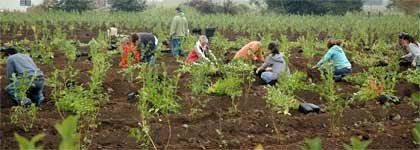Similar to an old-fashioned barn-raising, more than 50 volunteers turned out at Sue and Dave White’s Plateau area farm on a cool, misty Saturday morning to plant blueberries – 4,617 tender, young bushes.
“We’re so blessed to have all these folks come out,” said Dave White looking across three of his 10 acres of Osceola farm as friends from morning lap swim, church and work, as well as family members, were on their knees plopping blueberry stock into pre-dug holes.
The White’s plan is to offer a U-pick blueberry farm.
“We wanted something to give back to the community and to give to our children,” said Sue White, who teaches in Kent. She said the berry farm is her husband’s brainchild. “He loves to work with his hands and being outside.”
The U-pick blueberry farm started with a simple thought during a family Fourth of July gathering when the construction market was at a low.
“I knew Carol Wik had planted blueberries out on land in Veazie and was having a ball with it,” Dave White said. “We researched for a year and decided to go for it.”
Some might look at it as the custom home builder’s move into retirement.
“This is certainly not retiring,” he laughs. “This is a lot of work.”
And it’s a labor of love.
Sue White said the family wanted to maintain the integrity of the farmland, which they’ve owned for about 20 years. Soil tests indicated it was perfect for blueberries, not to mention all the other positive points the sweet, versatile berry presents.
“Blueberries are a superfood,” she points out quickly. “Low maintenance and they freeze well.”
As a teacher, it’s also a business that is summer only and family-friendly.
Family-friendly was much of the blueberry appeal. While researching, Dave White said, they enjoyed seeing people, families in particular, picking berries, talking and being outdoors together.
The sustainable, local food movement was also a driving force.
“It’s becoming more important for people from Enumclaw, Buckley and Black Diamond have a place where they can pick their own food,” Dave White said.
The Whites planted five different varieties – Duke, Draper, Spartan, Chandler and Liberty – from Oregon’s Fall Creek Nursery that should provide early-, middle- and late-season berries.



